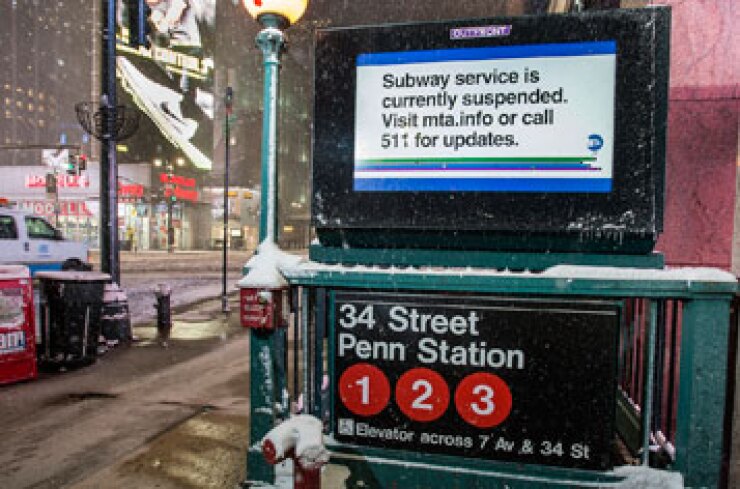
As seawalls collapsed and people lost power, the winter storm that struck the Northeast caused issuers to postpone about $1.7 billion of bond deals Tuesday, including a $1 billion general obligation sale from Pennsylvania.
Coastal Massachusetts was hit especially hard, notably Boston's South Shore suburbs, swamped by storm surges, while more than two feet of snow were reported by 9 a.m. in Worcester and Shrewsbury.
Normalcy began to creep back into New York City Tuesday after the National Weather Service downgraded the region's blizzard to a winter storm.
By then, the snowstorm had triggered a one-week delay in the competitive Pennsylvania deal, which was to have been the largest muni deal of the week.
Atlantic City, N.J., postponed its $12 million bond anticipation note sale, originally set for Tuesday.
Several other smaller issuers in Pennsylvania, New York, New Jersey, Connecticut, Massachusetts and Maine also postponed their sales, according to Ipreo.
Though the storm had a lighter-than-expected touch in New York, it hit Suffolk County in eastern Long Island hard, with more than two feet in some spots.
New York Gov. Andrew Cuomo said in a briefing in Lindenhurst Tuesday afternoon that the state is redeploying assets from New York City and the Hudson Valley toward Suffolk County to assist with snow cleanup.
Cuomo estimates the storm cleanup costs will be "in the millions."
"A tremendous amount of snow still needs to be removed from our roadways," said Cuomo. "We will have the resources here."
Travel bans were slowly being lifted in other states.
Officials throughout the Northeast said generally it was premature to assess cleanup costs.
"It's way too soon," said a press officer for the Metropolitan Transportation Authority, which operates New York City's subway system and the Metro North and Long Island Railroad commuter train systems.
In New York, the MTA resumed limited service Tuesday morning.
New York Mayor Bill de Blasio, while declining specifics at a noon press conference, said the cost to the city and to the region's economy would be "a lot less than it would have been had it hit full force."
De Blasio lifted a travel ban on city streets at 7:30 a.m.
"This storm was as big as predicted, but it went east," de Blasio told reporters at a noon press conference Tuesday. "We got lucky. Thank God for that."
To illustrate the near-miss, de Blasio pointed out that Long Island's Ronkonkoma, only 18 miles from the city, had 20 inches of snow. Orient, on the eastern tip of Long Island, was measured at 28.
Water surged above seawalls and washed away debris, including a car in Scituate, Mass., about 20 miles southeast of Boston. Officials in Scituate and nearby Hull commenced high-water evacuations.
In Marshfield, 10 miles further south, an 80-foot seawall collapsed. National Guard soldiers are assisting with four major operations, including a high water evacuation team standing by in Plymouth and Bourne.
The storm presented the first major test for Massachusetts Gov. Charlie Baker, who took office earlier this month. Baker's statewide travel ban took effect at midnight Monday. State offices were closed and the Massachusetts Bay Transportation Authority shut down subway service in Boston.
In Connecticut, Gov. Dannel Malloy lifted a travel ban for local roads at 2 p.m Tuesday.
The snow emergency remained in effect in Bridgeport, Connecticut's largest city, as of noon.
"This storm could have been much worse," said Mayor Bill Finch. "Publics facilities had a plan, they prepared, they trained and it paid off."
Rhode Island Gov. Gina Raimondo's travel restrictions were still in effect as of noon. The Newport, Jamestown and Mount Hope Bridges were closed.
Storm financing expert Alan Rubin, a managing director at public policy firm Mercury LLC, praised Northeast officials for their preparedness.
"People were right to shut down and I give the governors and other public officials credit for shutting traffic down," said Rubin. "I think Mayor de Blasio did a very good job in doing what he did."
In addition to the MTA, the bi-state Port Authority of New York and New Jersey resumed service Tuesday. All MTA and Port Authority bridges and tunnels reopened as did the Port Authority's PATH train system.
MTA Chairman Thomas Prendergast defended the decision to shut down the subways, invoking the memory of the Dec, 26, 2010, storm in which riders were stranded between outdoor stops.
"You recall we had 40-something subway trains and 600 buses stranded in 20 inches of snow. That was enough to inform us to protect the system and be able to shovel out more quickly," he said.
Rubin, nicknamed the "Hurricane Czar" for his role in designing the catastrophic insurance fund in Florida as a Lehman Brothers executive after Hurricane Andrew in 1992, defended Prendergast - and the MTA chairman's boss, Cuomo - adding that the MTA shutdown was for the public and not a total one.
"To fully shut down the system would have involved a costly revamping of it," he said. "You don't want to close it entirely unless you have a water problem, which was the case with Hurricane Sandy."
While praising public officials for being ahead of the action, Rubin warned against weather-forecasting hysteria. "They have to be careful about hyperbole, about 'most historic storm,' " he said. "The one thing they could do is have a quiet back-room channel and say 'this is the range, and this closer to what it will be.'"





